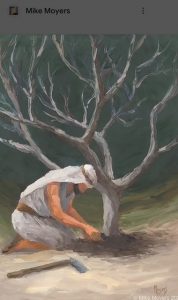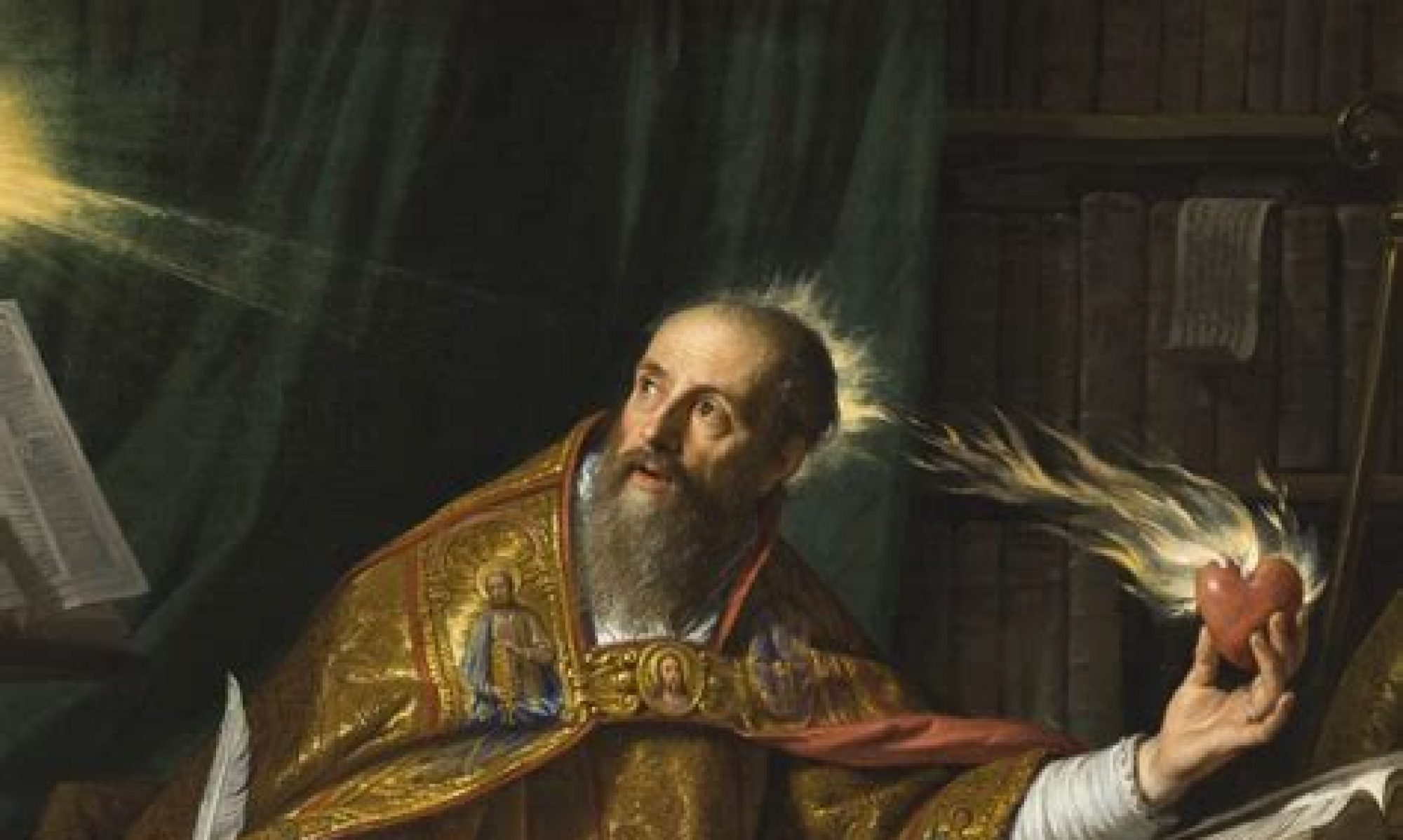Today is the 3rd Sunday of Lent. I don’t know how far ahead we make some changes in our lives. At times, it is hard to admit but we hope that halfway through, by God’s grace, we won’t be discouraged but will continue to persevere.
The first reading today, taken from the Book of Exodus, gives us an idea that God speaks to Jesus to Moses from a burning bush, and it is amazing that it does not consume the bush. The bush which was not consumed has a significant meaning; it tells us about God’s everlasting love for humanity.
Moses was aware of what was happening to him, for he was deeply attentive to God’s presence and engaged in listening to His voice. Moses was open to God to obey as he took off his shoes as he approaches the holiness of God. He heard God’s voice appointing him to do a mission, being chosen to release the Israelites from the slavery of the Egyptians. This was one of the many conversations of Moses with God, who said to him, “I Am Who Am sent me,” and remembering the “Who Am” who will always be with them.
In the 2nd reading from the 1st letter to the Corinthians, St. Paul says, “Whoever thinks he is standing secure should take care not to fall.” We are reminded and animated to engage with others in our pursuit of the truths that we may carry around with us. We need to work on the conversion of the mind and heart. If we want to be physically and spiritually healthy and happy ministering to others, we need to fix our minds on the right things. Thus, St. Paul writes that the Corinthians should be careful. Even when they think they know what they are doing, they may fall, like some of their ancestors did.
Today’s gospel narrates another parable about a landowner who planted a fig tree that did not produce fruit for three years. The landowner was very disappointed and willing to give up, instructing his gardener to cut it down. This gospel has many things to reflect on:
First, today’s gospel mentions a description of people’s concern about the existence of the suffering in the world. Jesus’ response was to clarify that their suffering physically is not caused by sin, which was the common religious belief at that time. Jesus never accepts their idea. He said, “I tell you, if you do not repent, you will perish as they did.” However, Jesus is warning them that they have enough to experience the compassion of God.
Second, in this parable, an owner discovered a fig tree planted in his orchard for three years and he came in search of fruit, but he found nothing, so he requests to have the tree chopped down. The gardener asks for one more year of hard work and then judgment can be made. Here, Jesus is the gardener who works hard to manifest love for salvation. He promises to dig around it and fertilize it, and if that does not produce fruit then it can go into the fire. The tree has exhausted the soil and perhaps the patience of the owner. Jesus reveals that He is the living God who is laboring to bring about the Kingdom of Justice with the fruits of compassion and mercy.
Third, the parable ends with their being cut away because of their lack of personal response to Jesus’ mission, teaching, and His offering of His very life. This had been proven when Israel brought them out of slavery into a fruitful promise, which many people had forgotten.
By Jesus’s coming to us, He labored much, not only repentance, but the fruits of repentance. Through Him, God’s fidelity is reassuring and a blessing to manifest that love in His incarnate presence among us.
During this third Sunday of Lent, we are invited to repentance and to re-evaluate our attitudes to conform with Jesus Christ’s mercy and love.
Jesus is directing this parable to all His hearers, inviting us to turn our old ways into the new creation of His kingdom. He applies God’s works of mercy so that we will be more fruitful. Jesus is the gardener of our lives who is patiently waiting for us.
Jesus is indeed a wise gardener who suggests, “I shall cultivate the ground around it and fertilize it; it may bear fruit in the future.” Jesus says that there is something deeper to which we should attend. Every day we should be preparing for a more fruitful life. He understands our hearts and knows that our instinct is to give up on the tree that bears no fruit. Please never give up on our Lent halfway through. Today Jesus tells us not to give up hope that we can be better. He offers us His love, care and His help. May our growing relationship with God lead us to a conversation of heart.
God bless you,
Fr. Arlon, osa
El Dictamen del Corazón
Tercer Domingo de Cuaresma, Año C
- Éxodo 3:1-8a, 13-15
- Salmo 103: 1-2, 3-4, 6-7, 8, 11
- 1 Corintios 10:1-6, 10-12
- Lucas 13:1-9
Hoy es el Tercer Domingo de Cuaresma. Cuántos cambios estamos haciendo en nuestras vidas en esta cuaresma? A veces, es difícil admitirlo, pero esperamos que, a mitad del camino, por la gracia de Dios, no nos desanimemos, sino que sigamos perseverando.
La primera lectura de hoy, tomada del Libro del Éxodo, nos muestra que Dios habla a Moisés desde una zarza ardiente. Lo sorprendente es que la zarza no se consume con el fuego. La zarza, que no se consume, tiene un significado profundo; nos habla del amor eterno de Dios por la humanidad.
Moisés estaba consciente de lo que le sucedía, porque estaba profundamente atento a la presencia de Dios y dispuesto a escuchar Su voz. Moisés estaba abierto a Dios y dispuesto a obedecer, pues se quitó los zapatos al acercarse a la santidad de Dios. Escuchó la voz de Dios que lo designaba para una misión: liberar a los israelitas de la esclavitud de los egipcios. Esta fue una de muchas conversaciones entre Moisés y Dios, quien le dijo: “Yo Soy el que Soy me envía”, recordándoles al “Yo Soy” que siempre estará con ellos.
En la segunda lectura, de la Primera Carta a los Corintios, San Pablo dice: “El que crea estar firme, que tenga cuidado de no caer”. Se nos recuerda y anima a comprometernos con los demás en nuestra búsqueda de la verdad que llevamos con nosotros. Necesitamos trabajar en la conversión tanto de la mente como del corazón. Si queremos ser físicamente y espiritualmente sanados y felices mientras ministramos a los demás, necesitamos fijar nuestra mente en lo correcto. Así, San Pablo escribe que los corintios deben tener cuidado. Incluso cuando piensan que saben lo que están haciendo, pueden caer, como algunos de sus antepasados lo hicieron.
El Evangelio de hoy relata otra parábola sobre un dueño de una tierra que plantó una higuera la cual no dio fruto durante tres años. El dueño estaba muy decepcionado y dispuesto a rendirse, instruyendo a su jardinero que la cortara. Este Evangelio tiene varios puntos en los cuales podemos reflexionar:
Primero, el Evangelio de hoy menciona la preocupación de la gente sobre la existencia del sufrimiento en el mundo. La respuesta de Jesús fue aclarar que el sufrimiento que experimentaban no era causado por el pecado, que era la creencia religiosa común en ese momento. Jesús rechazó esa idea y les dijo: “Les digo que, si no se arrepienten, perecerán de la misma manera que ellos”. Sin embargo, Jesús les advierte que tienen suficiente para experimentar la compasión de Dios.
Segundo, en esta parábola, un dueño descubrió una higuera plantada en su huerto durante tres años. Buscó frutos, pero no encontró ninguno. Entonces, pidió que se cortara el árbol. El jardinero pide un año más de trabajo arduo antes de que se pueda hacer un juicio. Aquí, Jesús es el jardinero que trabaja arduamente para manifestar el amor por la salvación. Él promete cavar alrededor de ella y abonarla, y si eso no da frutos, entonces podrá cortarse. El árbol ha agotado la tierra y quizás también la paciencia del dueño. Jesús revela que Él es el Dios vivo que está trabajando para traer el Reino de la Justicia con los frutos de la compasión y la misericordia.
Tercero, la parábola termina con el árbol siendo cortado debido a su falta de respuesta a la misión de Jesús, a su enseñanza, y a ofrecer Su propia vida. Esto se probó cuando Dios condujo a Israel fuera de la esclavitud hacia la promesa fructífera, una promesa que muchas personas han olvidado.
La venida de Jesús a nosotros no fue solo acerca del arrepentimiento, sino de los frutos del arrepentimiento. A través de Él, la fidelidad de Dios es reconfortante, y Su bendición se manifiesta en Su presencia encarnada entre nosotros.
Durante este tercer domingo de Cuaresma, se nos invita al arrepentimiento y a reevaluar nuestras actitudes, conformándolas a la misericordia y al amor de Jesucristo.
Jesús está dirigiendo esta parábola a todos Sus oyentes, invitándonos a convertir nuestros viejos caminos en la nueva creación de Su reino. Él aplica las obras de misericordia de Dios para que podamos ser más fructíferos. Jesús es el jardinero de nuestra vida, que espera pacientemente para que demos fruto. Él es, de hecho, un sabio jardinero que sugiere: “Cavaré alrededor de él y lo fertilizaré; tal vez dé fruto en el futuro”. Jesús dice que hay algo más profundo a lo que debemos atender. Cada día, debemos prepararnos para una vida más fructífera. Él entiende nuestros corazones y sabe que nuestro instinto es rendirnos con el árbol que no da fruto. Por favor, nunca se rindan a mitad de su Cuaresma. Hoy, Jesús nos dice que no perdamos la esperanza de que podemos ser mejores. Él nos ofrece Su amor, cuidado y Su ayuda. Que nuestra relación creciente con Dios nos lleve a una conversión de corazón.
Que Dios los bendiga,
P. Arlon, OSA

